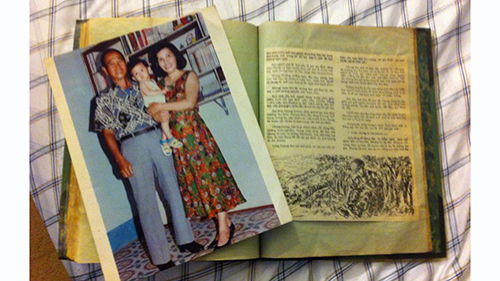“I am a Queer Vietnamese American, But Not Always in that Order”

The diversity of our nation is what makes us stronger and more connected, and immigrants are a part of the beautiful fabric of this country. Throughout history, immigrants have enriched the foundation and culture of the U.S. with our resilient narratives, colorful traditions and innovative contributions. This Immigrant Heritage Month, let’s celebrate immigrants, their journey and stories.
As a queer Vietnamese immigrant and the child of refugees, during Pride Month and Immigrant Heritage Month I recognize that I am a queer Vietnamese American, but not always necessarily in that order.
The Vietnamese diaspora carries a heavy history marked by war-torn stories, unspoken trauma and unfamiliar transitions in new homes and customs across the globe. My own story starts with my parents.
After the fall of Saigon in 1975, my father was incarcerated in so-called “re-education camps.” My mother, the only daughter out of seven children, worked to support her family while also pursuing education. She eventually became one of Saigon’s most respected educators and teachers.
It was in the early 1990s when my parents sought asylum to the U.S. However, after enduring years of austere conditions and trauma in the incarceration camps, my father would not make the trip abroad with my mother and me.
They named me “Tran Hoai Viet,” after my father, but my name also translated to “Eternally Vietnam” — a powerful reminder to always remember the country we left.

Though I was born abroad, I grew up in the U.S. and, like many other immigrants and first-generation folks, I struggle to navigate and reconcile my Vietnamese roots and my American upbringing.
When I first came out as gay, I was afraid of the ways it would further complicate my multiple identities and two distinct cultures and traditions.
To me, being a queer Vietnamese immigrant means that my coming out experience is a lifelong and ongoing process and oftentimes a two-front battle. In 2008, I came out to my friends in English. In 2018, I came out to my mom — yet this second time was entirely in Vietnamese. It was important to me to come out to my immigrant mother in a language that she understood best.
Heavy cultural expectations and language barriers made my coming out process even more challenging as someone who was navigating at the intersections of being queer, Vietnamese, American and an immigrant.
Many LGBTQ API immigrants will often share similar experiences and challenges. Many of us are at the cusp of two hemispheres, two generations, two tongues and, in many cases, two lives. The process to reconcile our multiple identities and experiences sometimes extends a lifetime.
As I honor Immigrant Heritage Month and my own story, I recognize that there is still a need for more representation and visibility across the spectrum. This Immigrant Heritage Month and Pride Month, I encourage you to explore your own heritage and history, honor the contributions of your communities and share your story to take on the challenges that we still face today.
For more information about the unique experiences of LGBTQ API youth in the U.S., click here. To read more about navigating the intersectional experience of coming out as LGBTQ for API people, click here.
You Might Like
